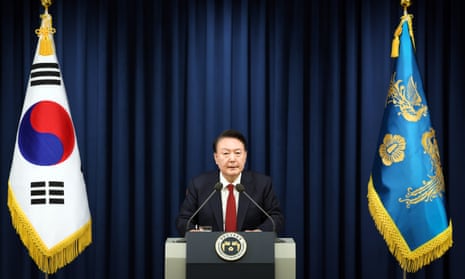
Top figure in Democratic party calls for Yoon to 'step down immediately'
Criticism of Yoon appears to be growing after South Korea’s president reversed an earlier martial law decree. Park Chan-dae, a top figure in the Democratic party, has called on the president to quit.
According to CNN, Park said Yoon must “step down immediately” and “cannot avoid the charge of treason” over his declaration of martial law.
His comments come shortly after the head of a minor opposition party vowed to impeach Yoon.
“He put all the people in shock,” Cho Kuk said. “The president is a dangerous being … threatening democracy and constitution.”
He vowed to impeach Yoon by putting together votes from other parties.
Key events Show key events only Please turn on JavaScript to use this feature
Political chaos in South Korea: what comes next?
Good morning,
It’s almost 9am in Seoul and if you are just catching up on South Korea being plunged into political turmoil, this explainer about what has unfolded over the past few hours will help you quickly get up to speed.
South Korea media condemns Yoon's shock martial law move
Hours after the shock declaration in South Korea, newspapers across the political spectrum published scathing editorials about the martial law manoeuvres, says Raphael Rashid, the Guardian’s reporter in Seoul.
The conservative and influential Chosun Ilbo published a searing editorial this morning, which said Yoon’s martial law declaration “severely crossed the line” of acceptable political bounds, and demanded accountability. The editorial said legal requirements weren’t met and called it a “national embarrassment” for a top 10 democracy.
Meanwhile, the left-leaning Hankyoreh’s editorial framed Yoon’s martial law declaration as a “betrayal of the people”, expressing disbelief that “21st century Korea” could see an elected president use the same justification (“anti-state forces plotting insurrection”) as the military junta did 45 years ago. It said that Yoon had “lost the minimum judgment and rationality required of a head of state”.
Largest labour union calls for Yoon to resign
South Korea’s largest umbrella labour union on Wednesday called an “indefinite general strike” until President Yoon Suk Yeol resigned, after he abandoned a short-lived attempt at martial law.
The 1.2 million-member Korean Confederation of Trade Unions accused Yoon of an “irrational and anti-democratic measure”, saying he had “declared the end of (his) own power”.
Ruling party leader calls for those responsible "to be held accountable"
The leader of South Korea’s ruling party has described President Yoon Seok Yeol’s attempt to impose martial law as “tragic”, and called for those involved to be held accountable.
“The president must directly and thoroughly explain this tragic situation,” People Power Party leader Han Dong-hoon told reporters in a televised broadcast on Wednesday, adding that “all those responsible must be held strictly accountable”.
Who is President Yoon Suk Yeol?
South Korean president Yoon Suk Yeol was elected in 2022 as a conservative political novice promising a tougher line on North Korea.
He has not had an easy ride, taking office with some of the lowest approval ratings of any democratically elected South Korean president.
Those ratings dropped even further to 19% in the latest Gallup poll last week, with many expressing dissatisfaction over his handling of the economy and controversies involving his wife, Kim Keon Hee.
In declaring martial law the South Korean leader accused the opposition of being “anti-state forces” and said he was acting to protect the country from “threats” posed by the North.
Born in Seoul in 1960, Yoon studied law and went on to become a star public prosecutor and anti-corruption crusader, playing an instrumental role in former president Park Geun-hye being convicted of abuse of power.
As the country’s top prosecutor in 2019, he also indicted a top aide of outgoing president Moon Jae-in in a fraud and bribery case that tarnished that administration’s image.
The conservative People Power Party (PPP), in opposition at the time, liked what they saw and convinced Yoon to become their presidential candidate.

He duly won in March 2022, beating Lee Jae-myung of the Democratic Party, but by the narrowest margin in South Korean history.
Yoon was never much loved, and a series of scandals - including his administration’s handling of a deadly Halloween crush of 2022 - have further eroded his popularity.
Critics have blamed Yoon’s administration for food inflation, a lagging economy, and increasing constraints on freedom of speech.
Yoon was earlier this year the subject of a petition calling for his impeachment, which proved so popular the parliamentary website hosting it experienced delays and crashes.
Here’s some more images of the events in Seoul:






Raphael Rashid
Raphael Rashid, our reporter in Seoul, writes that this morning the feeling in South Korea is one of bafflement and sadness.
For the older generation who fought the streets against military dictatorships, martial law equals dictatorships, not 21st century Korea. The younger generation is embarrassed that he’s ruined their country’s reputation. People are baffled. Also everyone is wondering what his end goal was. Expedited impeachment is the word on people’s lips.
Calls for Yoon to step down appear to be growing. Reuters is reporting Cho Kuk, head of a minor opposition party, met protesters outside parliament and said: “This isn’t over. He put all the people in shock.” He vowed to impeach Yoon by putting together votes from other parties.
Yonhap is reporting that after the lifting of the law, members of the opposition bloc ramped up criticism of Yoon with some even threatening to initiate a motion to impeach the president.
Hwang Un-ha, floor leader of the Rebuilding Korea Party, expressed his intention to push for an impeachment motion, lambasting the mobilisation of military personnel following the rare martial law declaration, according to Yonhap.
Speaking at an event with Japan’s ambassador to Washington, US deputy secretary of state Kurt Campbell, a longtime Asia diplomat, reiterated that the US-South Korea alliance is “ironclad” and the US would “stand by Korea in their time of uncertainty.”
Pentagon spokesperson Maj. Gen. Pat Ryder said there was no effect on the more than 27,000 US service members based in South Korea. They are not confined to base or under any type of curfew, Ryder said.
The White House said on Tuesday it was relieved that South Korean president Yoon Suk Yeol had reversed course over a martial law declaration in the country.
“Democracy is at the foundation of the U.S.-ROK alliance, and we will continue to monitor the situation,” a spokesperson said, referring to South Korea by the initials of its official name, the Republic of Korea.
Meanwhile, the leader of the governing party has told the president to explain his decision to declare martial law.
People Power Party leader Han Dong-hoon said in a statement early on Wednesday morning local time: “As the ruling party, we feel deeply sorry to the public.”
In comments reported on CNN, he added: “The president must directly and thoroughly explain this tragic situation. The minister of defense, who recommended this martial law, should be immediately dismissed, and all those responsible must be held strictly accountable.”
Top figure in Democratic party calls for Yoon to 'step down immediately'
Criticism of Yoon appears to be growing after South Korea’s president reversed an earlier martial law decree. Park Chan-dae, a top figure in the Democratic party, has called on the president to quit.
According to CNN, Park said Yoon must “step down immediately” and “cannot avoid the charge of treason” over his declaration of martial law.
His comments come shortly after the head of a minor opposition party vowed to impeach Yoon.
“He put all the people in shock,” Cho Kuk said. “The president is a dangerous being … threatening democracy and constitution.”
He vowed to impeach Yoon by putting together votes from other parties.
Analysis: Yoon Suk Yeol's gamble proves foolhardy

Julian Borger
In attempting to declare martial law, South Korea’s president, Yoon Suk Yeol, sought to awaken ghosts that the rest of the country thought had been laid to rest for good.
The last time martial law was declared, in 1980, hundreds of people were killed by the military dictator Chun Doo-hwan, who sent protesters to a concentration camp for “purificatory education”.
In the course of his meteoric rise to power from prosecutor to president, Yoon outraged much of the country by making complimentary remarks about Chun, claiming three years ago that many people thought the general had done well in politics apart from his coup and the crushing of protests …
Yoon’s short-lived declaration of martial law appears to have been a desperate gamble in the face of rock-bottom public popularity – with positive ratings barely over 10% – in the midst of a doctors’ strike and staunch political opposition, increasingly including his own People Power party, whose leader, Han Dong-hoon, said the move was a “wrong move”.
Yoon may have thought that his nostalgia for authoritarianism would resonate with at least some of the South Korean political spectrum, but the unanimous vote in the national assembly to overturn his declaration, including by his own party, suggests he miscalculated. Within hours, he was forced to back down, and martial law was formally lifted after a cabinet meeting.
South Korea’s president completed a dramatic U-turn on an announcement of martial law just hours after announcing it – and following a unanimous vote from MPs against the measure.
You can watch the moment Yoon Suk Yeol announcing that martial law will be lifted here:
My colleagues Amy Hawkins and Raphael Rashid have the full story of the day here:
South Korea’s rightwing president has been forced to back down after he unexpectedly declared martial law only to face unanimous opposition from the national assembly, in the most serious challenge to the country’s democracy since the 1980s.
President Yoon Suk Yeol declared martial law late on Tuesday amid a dispute with opposition parties he accused of pro-North Korean sympathies and anti-state activities.
But after some of the tensest hours in the country’s recent history, Yoon said troops would return to their barracks and the order would be lifted following a cabinet meeting.
The day so far
Right now, it is 6 am local time on Wednesday in South Korea, and here are some key developments from the last few hours, in case you missed it:
-
The country’s president, Yoon Suk Yeol has now said that he will lift the martial law declaration he had imposed just several hours before.
-
Yoon also said that troops had withdrawn from the National Assembly.
-
The lifting of martial law has now been approved by a vote of his cabinet.
-
The announcement from Yoon came after lawmakers voted unanimously to lift the president’s martial law decree several hours ago, with 190 of its 300 members present.
-
Many of the protesters who were demonstrating outside the General Assembly all night trickled out of the area, Reuters reports.
-
Cho Kuk the head of a minor opposition party has vowed to impeach Yoon by putting together votes from other parties.
-
The Korean Confederation of Trade Unions announced that they are going on an “indefinite general strike” until Yoon resigns.
What happened in the hours before that?
-
This all began Tuesday night local time when Yoon declared an “emergency martial law” during a televised briefing.
-
He accused the country’s opposition of controlling the parliament, sympathising with North Korea and paralysing the government with anti-state activities.
-
South Korea’s main opposition, the Democratic Party, which has a majority in parliament, then called on all its lawmakers to meet and assemble at the national assembly.
-
The country’s military then announced a suspension of all parliamentary activity, and under martial law, political activities are banned, protests are prohibited, and media is censored.
-
Thousands of protesters gathered outside the general assembly building as police blocked the entrance.
-
About 190 lawmakers then assembled and voted unanimously to lift the president’s martial law decree.
Here are some more photos from Seoul of the events that have unfolded over the last few hours:















 English (US)
English (US)